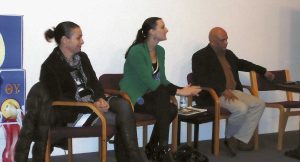by MICHAEL OTTO
Think back to your first conversation about sexuality, researcher Natalie Thorburn asked people gathered at Baradene College on a cold, windy night in June.
“Was it with your best friend, or your parents, or your school?” Ms Thorburn asked.
“For many of us it was a time of giggling and excited discussions,” she said.
Then she paused, before saying “Now imagine how different that conversation might have been if you grew up in a community where sexual activity was imposed on you.
“Or where it was only associated with financial value, or rejection. Or the avoidance of violence. How do we begin to comprehend [that] understanding of sex?”
Ms Thorburn was in a position to provide some insights, given the work she has done with 10 young people who had worked as child prostitutes in New Zealand.
She interviewed nine girls and one boy as part of her work towards a Masters of Social Work degree at the University of Auckland.
The participants contacted Ms Thorburn as a result of a widely distributed flyer and were paid $40 for being interviewed. All were older than 16 when she talked to them.
Being engaged in prostitution occurred when they were aged 12-16.
“All of the girls I interviewed had been raped or sexually abused, usually by multiple perpetrators or multiple partners,” Ms Thorburn told the Baradene meeting, which had been organised by Aotearoa New Zealand Religious Against Trafficking in Humans (ANZRATH).
But abuse and violence had been “normalised” in the chaotic lives of these young people.
Ms Thorburn related horrific tales of the violence they had suffered.
“One girl, for example, spoke about being repeatedly punched in the breast.
“And how she was paid $50 extra per punch for the privilege.
“Another, a young man, spoke about being so badly beaten that he had kidney damage. And how he would be paid extra for [it]. . . .
“For the girls, being raped or being sexually abused, or being beaten up, was simply considered a natural part of being female.
“There was no label of offence attached to it. They didn’t consider it to be against the law. And it never really occurred to them that they had the right to refuse any of the sexual actions that were proposed to them.”
Of course, paying people under the age of 18 for sex is against the law. But these kids often see themselves as worthless, Ms Thorburn said.
Many had suffered numerous experiences of abuse — from family members, friends, boyfriends, clients and people in their communities, she continued.
Many had grown up in dysfunctional families experiencing severe economic deprivation.
Drug dependency was also a factor for many of these young people and their families.
Some of the teens would don school uniform and attend classes, having been out all the previous night as prostitutes.
“These kids did go to a range of health and social services for help,” Ms Thorburn said. But this was to no avail.
Many of the kids ended up being in the “too hard basket”.
“Services expect them to respond to interventions as if they were logical adults,” Ms Thorburn said. “But their brain pathways and mental health have been affected by the trauma they have suffered.”
But Ms Thorburn ended on a note of hope.
These problems are fixable, she told the meeting.
“Anyone can be part of fixing it. It means keeping our eyes open, reporting abuse, offering help when teenagers you know, or who you see around, look like they might be in trouble.
“We shouldn’t have to wait for evidence or for proof before we take steps as a community to act.”
Ms Thorburn recommended people join or support organisations like ECPAT Child Alert.
If people can’t help teens directly, they should report suspected abuse to authorities, she said.
“Finally, we need to create a culture of consent,” she added.
Kym Kiri from the Ministry of Internal Affairs also spoke to the Baradene meeting about the dangers to children posed by online predators.
ECPAT Child Alert Trust director Warren Ferdinandus discussed the work his organisation is doing.
* A 2002 ECPAT study found 194 young people under 18 who were known by social services to have had sex for money.
A 2004 study of 47 NZ sex workers revealed that the mean age at which participants first used sex for survival was 13.5, with ages ranging from 9 to 17.
Another 2002 New Zealand study showed 31 per cent of 303 sex workers reported beginning their involvement in sex for money before the age of 18.

Reader Interactions